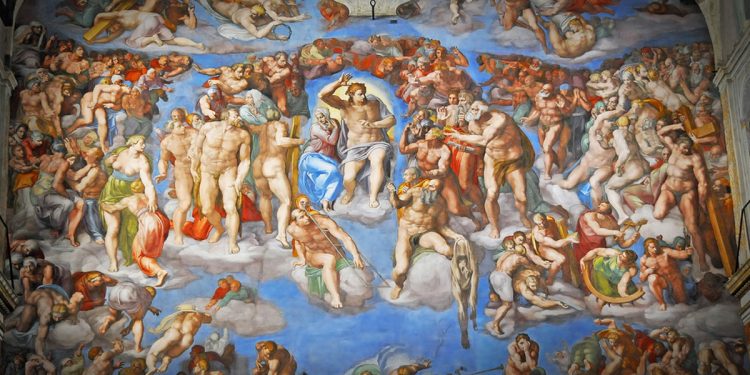
To reject their pronouncements, they said, was to blaspheme against the Holy Spirit: Luke 12's "unforgivable sin." Montanus was eventually condemned by the church, though not for his eschatology. Montanus and his female associates, Prisca and Maximilla, claimed the Millennium had begun and God had given them authority over the Christian church. Probably in 172, Montanus began to proclaim that Jerusalem would soon descend near Phrygia (west-central Asia Minor). The most worrisome of these were the Montanists. But late in the 100s, some Christians began to see signs that the Millennium was imminent. Its only importance to Christian living was as a reminder of the hope that should guide a Christian's life. Justin and Irenaeus spoke of the Millennium as a far-off event they hoped for someday. However, like Justin and unlike Papias, Irenaeus expected this to happen after the coming of the Antichrist and the second coming of Christ. Jerusalem would be rebuilt, famine would be unknown, and animals would live in harmony with each other and with man. In his book Against all Heresies, Irenaeus followed his teacher Papias, maintaining that when the faithful departed are raised, they will reign with Christ for a thousand years of bliss. 200) is best known for his vigorous defense of Christianity against the Gnostics on such points as the bodily resurrection of the dead. Justin appears to have been the first premillennialist. This seems to be the first post-scriptural writing that placed the Millennium after the Second Coming, thus clearly placing the present age before the Millennium. After the Millennium had been completed, the rest of humanity would rise from the dead then all would receive the Last Judgment. "Some who are called Christians … say there is no resurrection of the dead, and that their souls, when they die, are taken to heaven do not imagine that they are Christians" Second, Justin linked the beginning of the Millennium he expected not to Christ's resurrection, as Papias had done, but to Christ's "second advent." He believed faithful Christians would rise from the dead to live with Christ in the new Jerusalem. Still, he differed from Papias in two interesting ways.įirst, Justin said openly that not all Christians shared his expectation: "I and many others are of this opinion, and believe that such will take place … but, on the other hand, many who belong to the pure and pious faith, and are true Christians, think otherwise." Such tolerance was not given for other doctrines, such as the resurrection of the dead. In his Dialogue with Trypho, Justin affirmed his expectation that the faithful departed would rise from the dead and reign with Christ for a thousand years in a rebuilt Jerusalem. Justin Martyr (c.100-c.165) shared Papias's millennial expectation. If the Resurrection had not started the Millennium, perhaps the Second Coming would.

The question was simply when.Īs the years wore on, those who thought about the Millennium began to rethink the event that would initiate it. Those who expected the Millennium were confident that it would come. It appears that the delay was simply not an issue. Although some modern scholars speculate this might have caused dismay, there is no evidence-either in internal exhortations or in answers to external critics-that it bothered anyone.Ĭhristians routinely prayed that the end of the world be postponed. The first premillennialistĪs years turned into decades, and decades into centuries, it became clear that, in spite of the hopes of some, the Millennium hadn't started with Jesus' resurrection. But as Christians gained more experience with these expectations, they found sufficient reason to be wary. Some early orthodox and heretical Christians found the tangible, sensual expectations of the Millennium irresistible. The early Gnostic heretic Cerinthus (c.100) elaborated on the physical pleasures of the Millennium-including "nuptial" pleasures-to a degree that scandalized the orthodox. And when any of the saints shall lay hold of a cluster, another shall cry out, 'I am a better cluster, take me bless the Lord through me.'" Papias (c.60-120) was perhaps the first post-biblical author to describe the thousand-year visible Kingdom of Christ-the Millennium.



The days will come in which vines shall grow," imagined Papias of Hierapolis, "each having ten thousand branches, and in each branch ten thousand twigs, and in each true twig ten thousand shoots, and in each one of the shoots ten thousand clusters, and on every one of the clusters ten thousand grapes, and every grape when pressed will give two hundred gallons of wine.


 0 kommentar(er)
0 kommentar(er)
